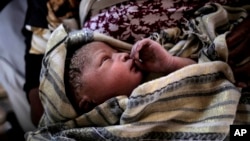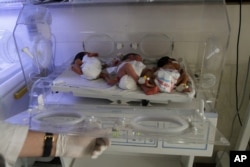More babies are dying each year in West and Central Africa even as child health improves overall, aid agencies said on Tuesday, calling the region’s newborn death rate a “hidden tragedy.”
Five of the 10 most dangerous countries to be born are in West and Central Africa, with infants there 50 times more likely to die within a month than if they were born in Japan or Iceland, the U.N. children’s agency UNICEF said in a report.
One in 16 pregnancies in the region results in stillbirth or death within a month — mostly preventable deaths caused by premature birth, labor complications or infection, UNICEF said.
“Neonatal health hasn’t really been addressed by governments or institutions,” UNICEF’s regional health specialist, Alain Prual, told the Thomson Reuters Foundation.
While the infant mortality rate is slowly declining, population growth means that the number of deaths is still increasing in West and Central Africa, Prual said.
For years aid agencies have focused on reducing deaths of children under five, which have dropped sharply, said Laurent Hiffler of medical charity Medecins Sans Frontieres (MSF).
Yet babies are still dying at high rates in the first month after they are born, he told the Thomson Reuters Foundation.
“Neonatal mortality reveals the weaknesses in the system,” said Hiffler, adding that it is difficult to address because it requires continuous care throughout pregnancy and birth. “It’s been a neglected tragedy ... a hidden tragedy.”
Only one in two women in the region gives birth in a health facility, often because clinics are few and far between and they cannot afford to travel, according to UNICEF.
Even when women can access a health center, staff are often poorly trained and ill-equipped, added Hiffler.
MSF teaches women simple birth techniques that can be carried out at home, such as basic resuscitation skills and using skin-to-skin contact to warm up premature babies, he said.
While the number of deaths among children under the age of five globally has more than halved in the last 25 years, progress in ending deaths of children less than one month old has been much slower, said Henrietta Fore, the new UNICEF chief.
“Given that the majority of these deaths are preventable, clearly, we are failing the world’s poorest babies,” she said.
Babies born in Japan, Iceland and Singapore have the best odds of survival globally, while newborns in Pakistan, Central African Republic and Afghanistan are the worst off, UNICEF said.






